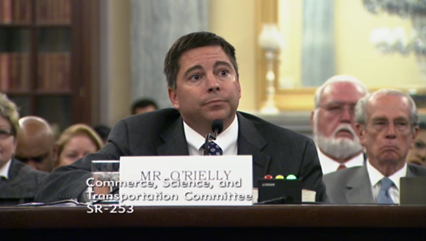O’Rielly: FCC Shows Horrific Treatment of Standard General-Tegna Deal
Former commissioner says agency’s hearing designation order skews due process

The smarter way to stay on top of broadcasting and cable industry. Sign up below
You are now subscribed
Your newsletter sign-up was successful
Any experienced telecom practitioner can share the basic truth that from time to time the Federal Communications Commission (FCC) simply makes mistakes and occasionally even skirts outside the bounds of its legal authority. While generally well-meaning, the agency is not infallible and it can be overly aggressive to serve select agendas.
To rectify this, there is a cherished right and longstanding practice that any party that has standing can challenge the commission to reconsider an action or petition the court to set aside a particular decision. Sometimes these challenges have strong arguments and win; often, they do not.
But what should concern everyone is when the FCC intentionally skews the process so much that objecting parties are procedurally prohibited from seeking any reasonable form of recourse. A few weeks ago, the commission did just this. By sidestepping the traditional determinative process, the agency’s staff, under newly found delegated authority, attempted to silently kill off the transfer of broadcast licenses between Tegna and Standard General. In essence, the highly-discredited and objectional procedure — known in FCC parlance as a Hearing Designation Order — attempts to send the application off on a slow boat to nowhere. Intentionally, this blatant process abuse likely will force parties to abandon their transaction without due process. If the commissioners themselves do not overturn this, which I have argued multiple times to allow delegated items to be brought before the full commission for a vote, I hope the court system will drop the red flag to restore fairness and justice.
To understand the outrageousness of the HDO, it is important to consider the timing of its adoption. While the commission moves glacially slow on so many matters, the transfer of licenses for broadcast television and radio stations tends to generate the strictest scrutiny and the longest delays. Applications involving media licenses can be delayed, bumping up against or exceeding the commission’s “aspirational” merger shot clock of 180 days. In the case of Tegna, the timeline has already stretched almost a full year. After multiple rounds of comment requests, the record was very complete, and it was essentially ready for a final decision. At the very last minute, the agency mic-drops the HDO under the guise of finding facts on select issues.
Consider that if the agency wanted to explore the designated issues, it had almost an entire year to do so. It previously publicly sought comment on applicants’ concessions for the very issues the HDO is supposedly exploring. Further, knowing how critical timing was to applicants, it could have set a narrow but definitive window for the Administrative Law Judge (ALJ) to conduct her work. Yet, it did neither.
Having served at the commission for many years and having been involved in prior HDOs, the justification provided in this case is really fiction. It is common knowledge within the FCC and its legal bar that the HDO process is a longstanding, bipartisan tool to kill transactions via the back door. It was that way under the commission of chairman Tom Wheeler, when it threatened to use it in the Comcast-Time Warner Cable application, and the same under the Ajit Pai commission’s use in the Sinclair Broadcast Group-Tribune Media proposed transaction. The agency has an undefeated record of successfully executing HDOs, and in some cases merely suggesting its use to parties, to end mergers. I refer to this process as a proverbial black hole as no entity ever escapes its clutches. To pretend an HDO in this instance is otherwise requires an immeasurable suspension of disbelief.
Critics of the merger may attack my views, suggesting I give no credence to the merits of their claims. The truth is that the substance is given short shrift by the agency when it adopted the HDO. Had the commission used a legitimate process, it could have given the applicants direction to resolve or even adopt opponents’ positions with appropriate retransmission consent firewalls and exorbitant station budgets. Certainly, it’s not hard to craft strengthened concessions to sufficiently ameliorate the concerns raised, despite any personal objections I might have. And the agency could have set a time deadline for the hearing of 30 or 60 days, which could have worked for the applicants and their financiers. But the agency went silent, avoiding any communications over how to fix any perceived deficiencies in the application, and moved to launch an ALJ review without time limits.
The smarter way to stay on top of broadcasting and cable industry. Sign up below
FCC process reform has been a multidecade project for me, becoming a career priority, because I firmly believe that the American people expect government officials to be fair — in processes used and decisions made. Adoption of the HDO in the Tegna transaction is anything but. Hopefully, this can be remedied before it’s too late, and certainly before the next time it is contemplated.
Michael O’Rielly served as a commissioner of the Federal Communications Commission from 2013 to 2020.

